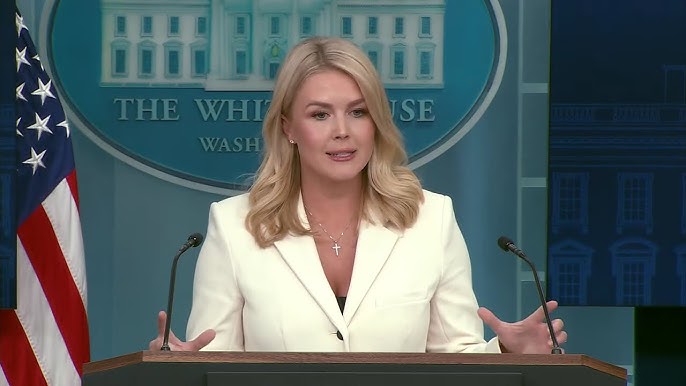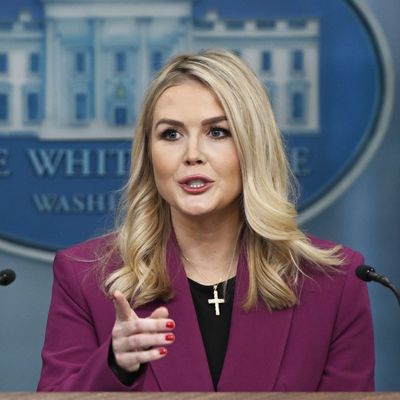The Power of Change: A Journey from Conflict to Healing for Karoline Leavitt and Dr. Warren Hensley
In a poignant tale of redemption, resilience, and the true meaning of empathy, Karoline Leavitt—former White House press secretary and a rising political figure—found herself at the heart of an unexpected personal and professional evolution. A dramatic incident at St. Laura Medical Center, involving a collapsed hospital, her husband Michael’s health crisis, and a shocking confrontation with Dr. Warren Hensley, the attending physician, ultimately led Karoline to confront her deeply held beliefs and the flaws within the very system she had long defended. What unfolded afterward would change her forever and, perhaps, also change the course of her future endeavors.
The Unexpected Moment of Reckoning
It all began as a typical visit to the hospital—a place Karoline had been to many times before, but never quite in this way. Her husband, Michael, a once indestructible Marine, had recently begun showing signs of serious health complications. Karoline, always strong and unflinching in her professional life, was suddenly grappling with something far more personal and terrifying. The sterile environment of the hospital seemed to amplify the anxiety gnawing at her, and as they were escorted to exam room 14 by the nurse, the weight of the situation settled in her chest like a heavy stone.

Her internal battle was palpable—this wasn’t just a routine visit; this was a potential turning point in her life, a moment where her political ideals, her professional composure, and her personal life were all about to collide.
The first sign that things were different came when Dr. Warren Hensley entered the room. To many, he was a seasoned medical professional; to Karoline, however, he was an ideological adversary. Their past interactions had been marked by sharp verbal sparring, but today, the tension in the room was of a different kind. The same man who had once publicly criticized her for “weaponizing disinformation” during a live TV debate now stood before her, tasked with saving her husband’s life.
The Shocking Exchange
When the conversation turned to Michael’s diagnosis, the interaction quickly escalated. Dr. Hensley, known for his sharp tongue and political edge, launched a veiled attack, implying that Karoline’s public stance on certain healthcare policies had rendered her incapable of properly addressing the crisis at hand. His comment about “alternative science” left a sting. Karoline, ever the composed professional, was taken aback but quickly found her voice. “I’m not here for a lecture,” she snapped, her patience worn thin.
What followed was an exchange that would define not just that moment, but the rest of her career. Dr. Hensley, still holding onto his critical, sarcastic stance, tried to undermine her argument by accusing her of prioritizing politics over her husband’s health. His words, though technically professional, came across as condescending and patronizing. This was not the same Dr. Hensley she had encountered before—the man who had once challenged her on a debate stage, but who had shown professionalism in the face of crisis. Today, he seemed distant, as though his agenda was more important than her husband’s well-being.
Karoline stood firm, despite the emotional weight bearing down on her. She maintained eye contact and calmly, but forcefully, rejected his insinuations. “I don’t care what you think of me. Just help him,” she demanded. Her words were laced with a vulnerability she had long hidden, but they also carried the weight of the responsibility she felt to protect her loved ones.
The Hospital Collapse: A New Kind of Crisis
Just as the confrontation began to simmer down, a horrifying turn of events shook the hospital to its core. A loud rumble reverberated through the building, followed by an explosion that shattered windows and sent shockwaves through the hallways. The hospital was in chaos. The walls groaned under the pressure, and screams filled the air as patients and staff scrambled for safety. In the midst of the panic, Karoline’s instincts kicked in. She immediately took action, dragging her husband towards safety, even as debris fell around them.

The true test of her character came as she navigated the perilous hospital corridors, now filled with smoke and rubble. She and Dr. Hensley, despite their earlier tensions, worked together to save lives. As they fought through the building’s destruction, their differences momentarily fell away. Hensley, who had been a vocal critic of Karoline’s political stances, now showed a different side. He risked his life to save strangers, including Karoline’s husband. It was a moment of unexpected camaraderie—one that would change both their perspectives.
The Heartbreaking Realization
Once they emerged from the rubble, Karoline was physically and emotionally drained. Her husband was stable, but her mind was racing with questions about the events that had unfolded. She had witnessed firsthand how the system she had so ardently defended could crumble under the weight of its own failures. In the midst of saving lives, they had uncovered dark secrets about the hospital’s operations—unapproved medical trials, lack of oversight, and a failure to follow protocols that could have spared many lives.
It was during this period of reflection that Karoline discovered a shocking truth. Documents found in the aftermath of the hospital collapse revealed that Dr. Hensley had authorized certain experimental treatments without patient consent—treatments that included her husband. The realization hit her like a freight train. The very man who had saved her husband’s life was the same one who had made decisions that could have endangered him.
The Fallout and the Public Response
In the days following the hospital collapse, Karoline was forced to confront the uncomfortable reality of what had happened. She could no longer defend Dr. Hensley’s actions, even though he had played a pivotal role in saving lives. As the media caught wind of the scandal, public opinion was divided. Some saw Hensley as a hero who had made difficult decisions under duress, while others condemned his actions as reckless and unethical.

Karoline’s own position was precarious. She had always been a staunch advocate for transparency, and now, faced with this truth, she could not stay silent. She made the brave decision to speak out, addressing the media and the public about what had transpired in the aftermath of the collapse. Her words were measured, but her message was clear: accountability must come first, no matter the consequences.
A Shift in Perspective
In the midst of the media frenzy, Karoline found herself questioning the very principles she had once stood by. As a political figure, she had always believed in the power of reform, but now she saw that change must come from within. Her experiences in the hospital had shown her that the system, while flawed, could still be a force for good—if those in positions of power were willing to confront the truth, no matter how uncomfortable it was.
Her journey had taken her from a place of political certainty to a deeper understanding of human vulnerability and resilience. As she continued to grapple with the consequences of her actions, she realized that her role in the political sphere could no longer be defined by ideology alone. It was now about empathy, accountability, and the ability to listen to the voices of those who had been left behind.
Moving Forward: A New Chapter for Karoline Leavitt
As Karoline stepped away from the chaos of the media circus, she began to rebuild her life and her career. She chose to focus on her family and her advocacy work, using her newfound platform to fight for better healthcare policies, more transparency, and greater accountability within the system.
Karoline’s story is a testament to the power of personal growth and the ability to evolve in the face of adversity. While the political landscape continued to shift around her, Karoline’s unwavering commitment to the truth and to the people who depended on her gave her the strength to move forward.
As she continues her journey, one thing remains certain: the woman who once fiercely defended the system is now working to reform it, driven by a newfound sense of purpose and compassion. And as the world watches, Karoline Leavitt’s story is far from over. The best is yet to come.
Conclusion
The journey of Karoline Leavitt is a powerful reminder that the most impactful changes come not from grand political statements, but from the courage to confront the uncomfortable truths that lie hidden beneath the surface. Her experiences in the face of personal and professional turmoil have shaped her into a more compassionate, more empathetic leader, and the path ahead promises even greater accomplishments. The political landscape may be ever-changing, but Karoline’s commitment to truth, justice, and humanity remains constant.